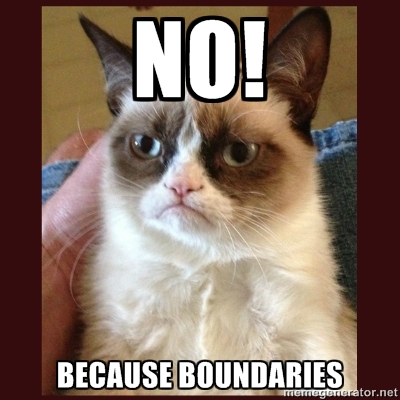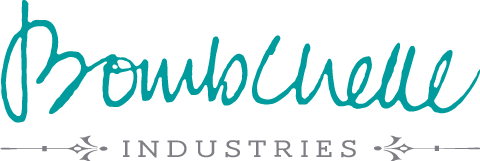
The Declaration of You will be published by North Light Craft Books this summer, with readers getting all the permission they’ve craved to step passionately into their lives, discover how they and their gifts are unique and uncover what they are meant to do! This post is part of The Declaration of You’s BlogLovin’ Tour, which I’m totally jazzed to participate in alongside over 100 other creative bloggers. Learn more — and join us! — by clicking here.

(brilliant image courtesy of Nathan Briggs)
The theme for this week of the tour is self care, and what’s more self-care-y than boundaries, after all? Without them, your life as a service provider and/or business owner can be overrun with stress & unreasonable demands. And generally, people want to avoid that, so let’s talk about boundaries. Howeva, let’s talk it the way I talk it – sans fluff, and with actionable tips.
(And also, the disclaimer that I’m still practicing some of these things myself…so please don’t hold me up as a perfect beacon of boundaries. Puh-lease do not.)
Boundaries for your inbox
I have two favorite tools here:
TOTALLY FREE. Oh yeah. This is a fairly self explanatory concept – you download it, use it, pause your inbox, and while your inbox is paused, nothing hits it. The emails are hidden in a special folder until you unpause your inbox, at which point the app moves it back.
Boomerang makes it so much easier for you not to forget about an email (you can set it so that an email shows up back in your inbox after 5 days, if, for example, you’re waiting on information to move forward, or you can set it to boomerang only if there’s no reply from the other person in a few days). It also makes it super-simple to schedule an email to go out at a specific time. Plans start at free and go up to a very-reasonable $15/month.
How do I use them + what are my email tactics?
- I pause my inbox before I dive into my own business work for an hour or two at a time – otherwise, it’s really easy to get caught up in putting out fires or stay in reactive mode. I usually pause it early in the day, work through everything in there that I can, and then work on other projects until lunch; I unpause it about 15 minutes before I go on my lunch break to see if anything urgent came up, and then pause it again for my lunch break. After lunch, I address anything pressing and then pause it again until 45-60 minutes before I “clock out” for the day (depending on what I’m doing), and I have another email processing chunk.
- Boomerang is great for if I’m replying right before the end of the workday, or if I don’t want to forget an email thread. I’ll use it to remind me of an email in a few days, and I also will schedule it so that the email goes out during business hours, if I’m working outside of my office hours (see below).
- Also, filters, y’all. Filters are great. And Unroll.me. These four tools together = inbox bliss.
Office hours
I cannot stress this enough. It gets its own heading because that’s how much it needs stressed. HAVE SET OFFICE HOURS. Mine are Monday through Friday, 9-5 CST. I will very, very occasionally work outside of these hours or book appointments outside of them (really only in cases of my Australian or New Zealand clients, who have time zone wonkiness to contend with and thus a valid excuse). But other than that, outside of those hours, I don’t work, reply to emails, or schedule meetings. Before I had office hours, I regularly found myself working until 7 or 8 at night with no breaks.
Which brings me to my next point: have set breaks. I used to work 8-10 hour days with literally no breaks except to get up to pee and to take my dog out, until I realized that working someone else that way would be, yanno, totally illegal, so maybe I should not do that to myself. My lunch hour is from 1-2 PM and I also take 5 minute breaks every 30 minutes to get up and walk around/do some exercise/etc.
Policies
There’s three main groups I see here:
Cancellation & rescheduling policies
Things to think about here:
- How many times will you allow a client to reschedule before an appointment is void?
- How much warning do you need to reschedule an appointment? 24 hours? 48 hours?
- If a client cancels the day before an appointment and decides they want a refund, what’s your refund policy?
Have these and communicate them to your clients, either pre-booking or immediately after booking. Recently, a friend of mine had a client who booked a one-day-intensive type service, and then cancelled three days before – when the appointment had been on the books for three weeks, my friend had already done most of the prep work for the appointment, and my friend had turned down other appointments because of that booking. And she didn’t have a refund policy that had been set ahead of time. Ouch.
Client screening policies
These don’t have to be things that the client sees. You don’t even necessarily have to write them down (though I’d recommend it, it’s a good exercise). For me, these are phrases that set off red flags. Mine are: “I’m totally ADD all the time”, “I just need someone to stand over me and make sure it gets done”, and “I can’t ever seem to actually take action”.
The first one is 50/50 – if I hear it in a consult I’ll ask more questions around it. (Especially because people use “ADD” all the damn time and mean entirely different things with it.) But 99% of the time, if the other two phrases turn up, the potential client would be a horrible fit. Neither of us is at fault, just like it’s not a dress’s fault if it’s a size too big or too small for you, it’s simply a bad fit. Having some kind of screening policy has saved me a lot of headache – especially now that I know who to refer people to for specific problems, so that I don’t feel like I’m just leaving this person out in the cold. (This is one reason I specified in my video about Rock the Rest of 2013 who the course is definitely not for.)
Communication & turnaround policies
This is a big one that a lot of people don’t think about. What kind of timeframe do you expect from your clients (and should your clients expect from you) when it comes to things like:
- answering questions?
- sending in the first draft of a project?
- responding to email?
Not having + sticking to communication and turnaround policies is how a two week service package stretches out into a six week one. (Another contributor is not having actual systems for your services, but that’s a whole ‘nother barrel of monkeys. Check out Rock the System or the Kick Burnout Kit for more on that.)
And of course, actually communicate all of these policies to your clients + any peeps on your team. Having them in your head is great for your personal boundaries but you need to build boundaries that other people can see and thus actually honor.
Honor your boundaries (and honor the boundaries of others)
This is the part that tends to really trip people up.
For one thing, you can’t expect people to honor boundaries you don’t have (or set). Yes, they might be asking too much of you or being totally unreasonable – but it’s your job as a business owner to make sure that they understand that and that they understand why. Every time I’ve felt taken advantage of or thought “holy shit this person is high maintenance”, I think back over my behavior and realize I sent mixed signals to them at some point.
This is why I don’t feel like it’s disingenuous to sometimes have a late night working on email, but use a tool like Boomerang to schedule the emails to get sent during business hours. If you send an email wayyyy outside of business hours, it means you’re not clearly communicating your boundaries to your client. Which means they’re likely to get confused, and then think: “Well, she replied to an email once when I sent it at 8:30 PM, how come she didn’t reply to this email when I sent it at 6? She worked that one weekend for me, why won’t she work this weekend?” Then nobody’s happy.
This is not, of course, a get-out-of-jail-free card for someone who’s being a total asshole – they’re still an asshole – but if you manage expectations & set boundaries from the get go, it’s likely that:
- less assholes will show up, if any, because jerks who take advantage of people can smell good boundaries a mile away
- people who could have turned into jerkish clients given the chance will not, because they’re totally clear from ground zero on what’s going on and what they can reasonably expect from you
For another thing, if you’re not holding up your end of the bargain – if you’re not honoring the boundaries of other people (or sticking to your own rules, like, for example, expecting clients to answer email within 48 hours but taking four or five days to answer their emails on a regular basis), you tend to wind up in shitty situations. I don’t know if it’s karma or what, but it’s happened to me and I’ve seen it happen to other people.
So. Those are my boundaries suggestions – what do you do to enforce boundaries in your biz?
